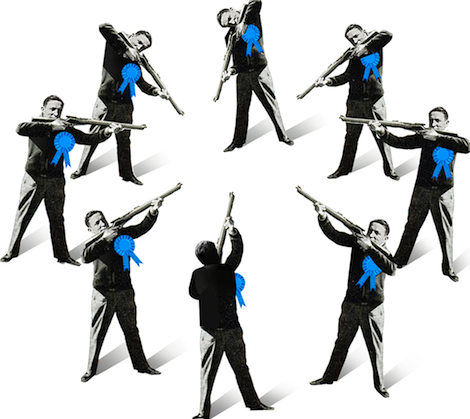
The hot new thing among the gut-trading, gunslingers of yore is to bring in quants and PhDs and data scientists and algos to address the lack of alpha that’s been competed out of the hedge fund game.
Old school tape-readers, who made their bones when there was still a human component to the futures / equities market are going to incorporate quantitative measures to make a comeback, now that it’s all computer-on-computer violence out in the Street. The long-short kings of “information asymmetry” are turning to Excel now that “I know a guy…” is no longer gonna fly.
Point72, formerly SAC, just announced a $250 million investment into Quantopian, a crowdsourced fund comprised of algorithms and data-mined strategies. Paul Tudor Jones, whose flagship fund has been alpha-challenged for almost a decade now, is calling in the Geek Squad to computerfy his firm’s trading situation.
Jones, suffering losses and about $700 million in investor withdrawals in the second quarter, has accelerated a high-tech revamp at Tudor Investment Corp. in the past year, according to three people familiar with the matter. Scientists and mathematicians, some with doctorates, have joined Tudor to bring new analytical rigor to its trading strategies, the people said.
It may work.
But the Paradox of Quant is going to come into play eventually. The more firms (and dollars) there are seeking to emulate the success of Two Sigma and Renaissance Technologies, the less gains there will be to go around. There aren’t going to be ten or twenty RenTechs (although there could be, but all of them with lower returns).
Today’s arms race into quantitative and algorithmically driven strategies will be no different than all other Wall Street arms races of the past: The getting is good at first, until it works. Then it becomes a circular firing squad, as thousands of people and institutions pick each other’s profits off while engaging in similar strategies. This very thing is playing out in Smart Beta as we speak, with over $425 billion now allocated to factor-based ETFs, almost a third of the entire ETF market.
Once crowded, there are a few choices for practitioners of a given investing discipline:
- pretend it’s not over
- adapt and move on to the next thing
- LEVERAGE UP
- sell out to a competitor
You will be hearing a lot about the triumph of quant strategies in the hedge fund space, now that almost no one believes in the omniscience of the 90’s era masters anymore. It’s going to be the cool thing to do, Go Algo! You probably want to be selling the picks and shovels here rather than counting on finding an enduring vein of gold as a prospector. Quantopian had the right idea.
***
My friend and colleague Dan McConlogue tells a great story about The Merger Fund, an arbitrage mutual fund meant to profit from the distance between an acquirer’s offer and a target’s price in the narrow window of time between the announcement of a takeover and the closing of the deal. It was a great fund and the profits were both non-correlated and steady.
“And then in February 2001, in comes Mario Gabelli to the space with a gajillion dollars to invest. Game over, I sold out of the fund that month.”
The Merger Fund has compounded at just 2.62% a year in the 15 years since. You’d have made double that return in the Barclays Aggregate Bond Index (annualized 4.97%), paying practically nothing for your troubles.
Game over, indeed.




… [Trackback]
[…] Information to that Topic: thereformedbroker.com/2016/08/03/the-paradox-of-quant/ […]
… [Trackback]
[…] Read More on on that Topic: thereformedbroker.com/2016/08/03/the-paradox-of-quant/ […]